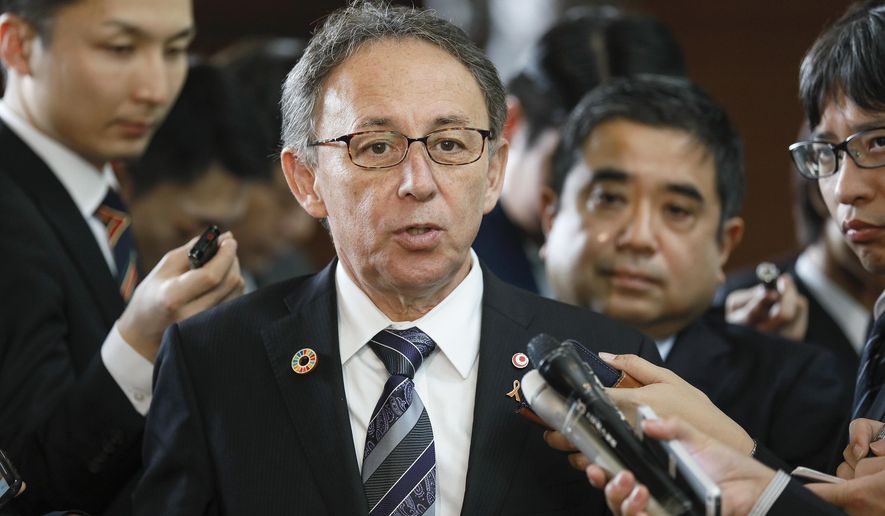TOKYO (AP) - The governor of Okinawa in southern Japan pushed Friday for three-way talks involving his prefecture, the central government and the U.S. on what steps to take following a referendum that rejected a relocation plan for an American military base.
The referendum is not legally binding but Gov. Denny Tamaki stressed that it must be respected as indicating the will of the people of Okinawa. He said that dialogue is key to reaching a solution.
“The democracy of the Japanese government is now being tested,” Tamaki told reporters after meeting Prime Minister Shinzo Abe and U.S. Deputy Chief of Mission Joseph Young in Tokyo.
Tamaki said he delivered a letter for President Donald Trump about the referendum. He did not elaborate on what might be discussed at the three-way talks, but stressed the results of the referendum “speak for everything.”
Sunday’s vote showed that 72 percent of Okinawans oppose the plan for the Marine air base being built on a landfill in coastal Henoko.
The plan, decades in the making, calls for Henoko to replace another base in Okinawa’s Futenma, a crowded residential area, that has long been criticized as noisy and dangerous. Many residents want the base moved completely off Okinawa.
The U.S. military, while declining comment on the referendum, has said the Henoko agreement is needed for regional security.
Abe has repeatedly said the Henoko plan won’t be changed, but Tamaki said Abe did not reject the referendum outright or his request for more dialogue.
Construction has been continuing at Henoko. The Okinawa prefectural government estimated recently that it won’t be completed for another 13 years, and projected costs have ballooned to 2.5 trillion yen ($22 billion), or about 10 times the initial estimate.
Critics of the relocation say sea life such as the manatee-relative dugong and coral reefs will be hurt.
The referendum has added momentum to Tamaki’s efforts against the U.S. bases.
Jinshiro Motoyama, who was born and raised near Futenma and spearheaded the referendum, said Japan’s security policy should be acceptable to the people of Okinawa, and what was at stake were issues like human rights, freedom and democracy.
“Our voice has always been ignored,” he said, appearing at the Foreign Correspondents’ Club of Japan with Tamaki. “Please help us. Please help Okinawa.”
Such sentiments have resonated not only with the residents of the subtropical islands of Okinawa but also the rest of Japan as well as internationally.
A petition to the White House in support of the referendum collected more than 210,000 signatures, and a new petition has been started to protest the construction at Henoko.
The relocation plan has its beginnings in 1995, when outrage erupted against U.S. service members over the rape of a 12-year-old girl. Washington also agreed to transfer some personnel to the U.S. Pacific territory of Guam.
Although Okinawa makes up less than 1 percent of Japan’s land space, it hosts about half of the 54,000 American troops stationed in Japan, and is home to 64 percent of the land used by the U.S. bases in the country under a bilateral security treaty.
___
Yuri Kageyama is on Twitter at https://twitter.com/yurikageyama
On Instagram at https://www.instagram.com/yurikageyama/?hl=en
___
This story has been corrected to show that name is Denny instead of Danny.




Please read our comment policy before commenting.